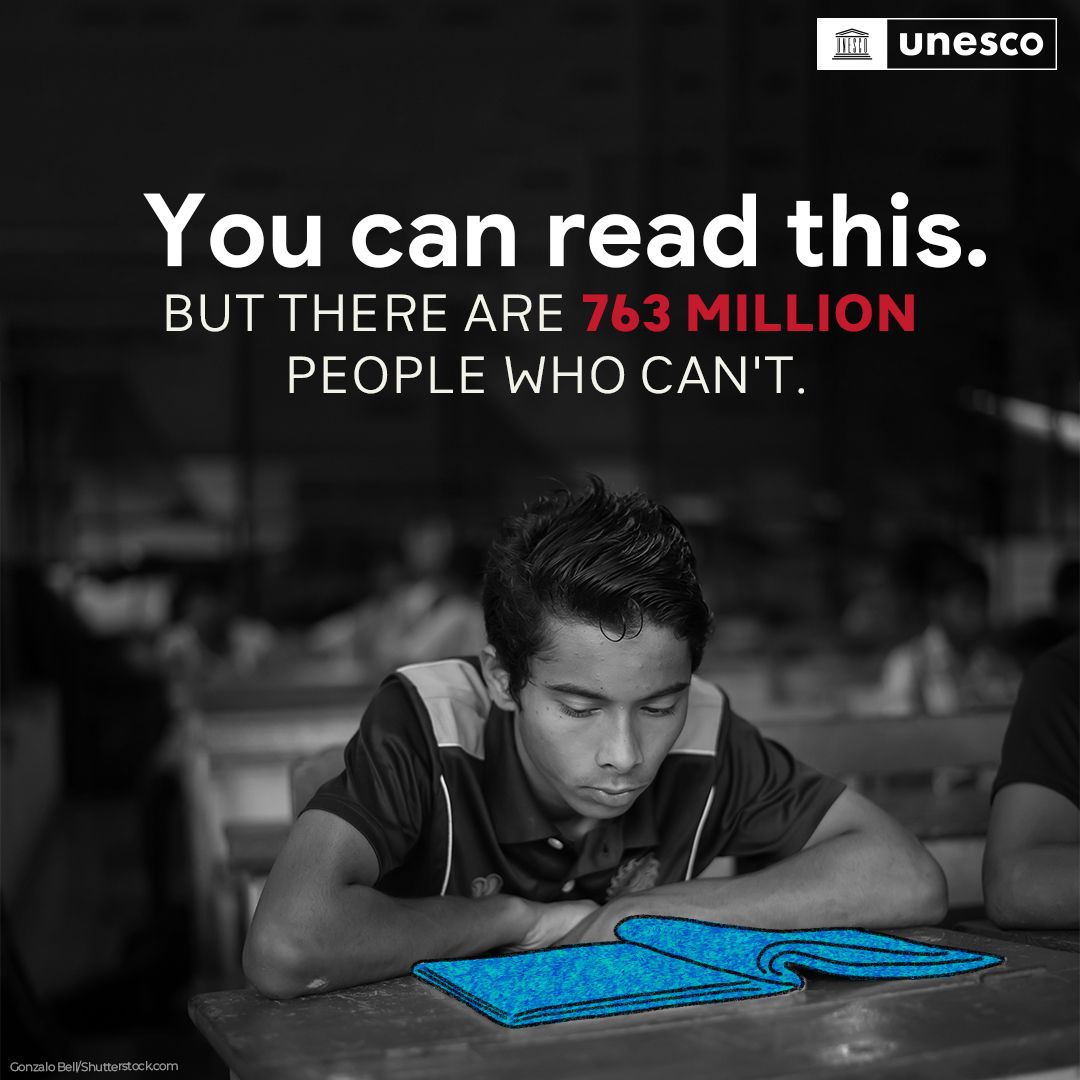8 September: UNESCO International Literacy Day
Literacy is central to equipping people with the appropriate knowledge, skills and competencies, transforming education and shaping more sustainable and peaceful societies.
This year marks the mid-term of the 2030 Agenda for Sustainable Development and its 17 goals (SDGs). By resolving to achieve this agenda, countries and partners have envisioned a future world that is peaceful, just, inclusive, and free from poverty, hunger and inequality.
However, as the UN Secretary-General's latest report points out, the SDGs are "in deep trouble"[1]. Despite progress in many areas, “a preliminary assessment of the roughly 140 targets with data show only about 12 per cent are on track; close to half, though showing progress, are moderately or severely off track and some 30 per cent have either seen no movement or regressed below the 2015 baseline." The impact of the COVID 19 pandemic, as well as other challenges such as climate change, digitalization, growing inequalities, polarization of societies and conflict, is increasingly being felt in various sectors.
SDG4 on education and lifelong learning is no exception. It faces persistent and interlinked challenges of equity, inclusion, and equality of opportunity, as well as quality and relevance[2] . In 2020, at least one in seven adolescents and adults aged 15 and above worldwide (763 million) did not have basic literacy and numeracy skills[3]. In addition, a significant number of children, including those already in school, do not acquire basic literacy and numeracy skills, while 244 million children and adolescents aged 6-18 are not in school[4]. The COVID-19 crisis, along with other global challenges, has exacerbated the education and literacy problems of millions of children, youth and adults, especially those who were already marginalized before the pandemic. This is why International Literacy Day 2023 (ILD2023) focuses on "Promoting literacy for a changing world: laying the foundations for sustainable and peaceful societies".
On one hand, literacy empowers people and improves their self-esteem, creativity, and critical thinking. It enables them to acquire the knowledge, skills, attitudes, and values they need to succeed in our rapidly changing society and economy. Thus, literacy contributes not only to personal benefits such as improved well-being and better economic conditions, but also to social, economic, political, cultural, and environmental benefits[5]. For example, literacy programs have been shown to contribute to strengthening democratic values, peaceful coexistence and community solidarity[6]. Through a critical and emancipatory approach, literacy can help people "engage and take an active role both locally and globally to address global challenges"[7] and become an agent of change for more sustainable and peaceful societies.
On the other hand, progress in other development areas such as health, agriculture, water, energy, transport, and peace can improve the conditions and environments in which people live, work and learn. More reading materials, libraries and learning opportunities in various forms that become available through socio-economic development can promote literacy. But not all new developments necessarily create favorable conditions for the fulfilment of everyone's right to education. For example, the advance of digital technology: while its potential to expand teaching and learning has been demonstrated recently, during the COVID-19 crisis, several problems have been highlighted, including the digital divide, which has disproportionately affected marginalized people in terms of access to quality learning, and its misrepresentation in the context of AI-driven learning[8]. New services for convenience, such as speech recognition, automatic dictation, and interpretation services, can discourage people from seeking literacy.
UNESCO Focus of the International Literacy Day 2023
During the international hybrid conference on "Promoting literacy for a changing world: laying the foundations for sustainable and peaceful societies" on 8 September, how lifelong literacy and numeracy approaches can be translated into concrete solutions and actions at the system, program and practice levels will be explored. Attention will be paid to learning content that links literacy to the acquisition of other knowledge, skills, attitudes, values, and competencies.
[1] United Nations (2023). Progress towards the Sustainable Development Goals: Towards a Rescue Plan for People and Planet: Report of the Secretary General (Special Edition), Advance unedited version (A/78/XX-E/2023/XX).
[2] UNESCO and Sustainable Development Goal 4-Education 2030 High-Level Steering Committee (SDG4-HLSC) (2023). The SDG4-Education 2030 High-Level Steering Committee’s contribution to the 2023 High-Level Political Forum on Sustainable Development.
[2] UNESCO Institute for Statistics, 2023
[3] UNESCO Institute for Statistics, 2023
[4] Global Monitoring Report Team and UNESCO Institute for Statistics (2022). New estimation confirms out-of-school population is growing in sub-Saharan Africa. Paris: UNESCO.
[5] Please see, among others, UNESCO (2006). EFA Global Monitoring Report on Literacy for Life. Paris: UNESCO and UIL (2022) Fifth Global Report on Adult Learning and Education. Hamburg: UIL.
[6] UIL (2016) Third Global Report on Adult Learning and Education: The impact of Adult Learning and Education on Health and Well-Being: Empowerment and the Labour Market; and Social, Civic and Community Life. Hamburg: UIL.
[7] UNESCO (2014). Global Citizenship Education: Preparing leaners for the challenges of the 21st century, Paris: UNESCO.
[8] Facer, K. and Selwyn, N. (2021). Digital technology and the futures of education – towards ‘non-stupid’ optimism. Background paper for the Futures of Education Initiative. Paris: UNESCO or the Futures of Education Initiative. Paris: UNESCO
Downloads
- ild-2023-conceptnote-en_1.pdf 529 KB (pdf)
Links

